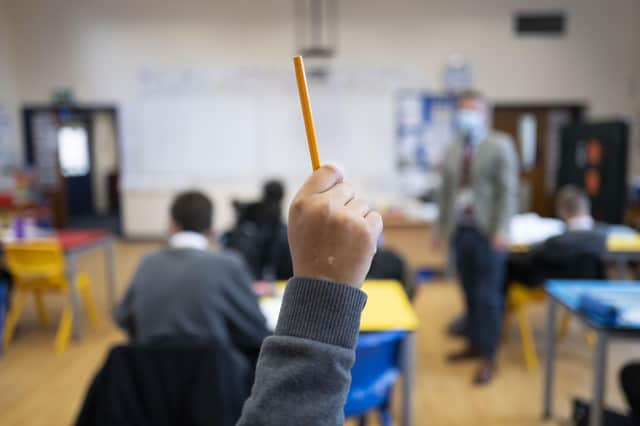Scottish education: Why jargon about 'learners' is contributing to slide down international league tables – Cameron Wyllie


One of the symptoms of the malaise of Education with a ‘big E’ in Scotland has been the advent of an in-group code used to propagate whatever the latest ideas are, in an attempt to give teaching the same mystique as medicine or the law, when, of course, it might rather be better if these honourable professions moved as far as possible towards Plain English.
I have always, in particular, had an aversion to describing the young people in our schools as “learners”. In the latter years of my career as a teacher and a senior manager in schools, I used to screw up my face when a prospective recruit to the staff used that.
Advertisement
Hide AdAdvertisement
Hide AdI imagined this just to be a meeting place between a grumpy old man rejecting new-fangled terminology and some kind of poetic sensibility disliking the ugliness of the word, which for me always has the association of the Highway Code and failing to learn to parallel park properly (fortunately not part of the test, sorry the “criterion graded assessment”, when I passed, on my fifth attempt, aged 31).
When I was at school, and when I started teaching, the boys and girls in school were called ‘pupils’; by the end of my career I was happy to call them “students” in secondary schools, and most often was happy with “boys and girls” or “children” in primary school. I have never called anyone in a school context a “learner” in my life.
My feelings about this jargon have, more or less, run parallel to my feelings about much of the academic educational world.
Now I am not, and never have been, anything like an academic; I think, in essence, I’m not that clever, or, to put it in a pleasingly modern way, my intelligences are not of that nature.
In my whole career, I probably read no more than a handful of articles or books which really made me think, and one or two of them maybe changed my classroom practice a bit, the most impactful being the work of Dylan Wiliam, whom most teachers over 50 will have heard of and who had lots of practical things to say.
But most educational stuff meant nothing at all to me and, as the years passed and my practice seemed at least reasonably effective, this lack of interest in the cutting edge of educational philosophy failed to bother me one bit. Anyway, there was the marking to do and the bins to take out.
But even the oldest dog can occasionally learn a new trick, so respect to the Dutch educationalist Gert Biesta, an article by whom a friend suggested I should read and which has, all these years on, explained to me what the problem is with calling young people “learners”.
To summarise, as I say, we used to call young people in school classrooms ‘pupils’ and that was an interesting albeit rather old-fashioned word. The thing about that word is that you are a “pupil” of somebody, a use now reserved, as far as I can see, for the arts – as in, “Albert is a pupil of the world-class timpani player, Max Thumpydump”.
Advertisement
Hide AdAdvertisement
Hide AdThen again the word “student” seems to me to suggest a relationship between a teacher and a student. Mr Biesta has formulated the (particularly ugly and deliberately so) word “learnification”, to describe the phenomenon (not, incidentally restricted to Scotland) of moving the responsibility for education on to the shoulders of the “learner”, so instead of “students” and “education”, we talk about “learners” and “learning”.
To put it in a nutshell, a person can be educated by someone else, but “learning” is an individual activity. Say you’re bored in a lesson at school, you’re an “unsuccessful learner” and that, increasingly as you get older, is your fault, whereas, it might reasonably be argued that if a young person is disengaged in the classroom it’s up to the teacher to engage them.
Increasingly in Scotland, we are understanding the messiness of the Curriculum for Excellence – a report by the Organisation for Economic Co-operation and Development (OECD) quite rightly criticised its implementation, echoing teachers throughout the country who haven’t been supported and have instead faced mountains of documentation mainly written in the jargon mentioned above.
But I really think its focus is all wrong theoretically, one of its idealised aims being that young people should emerge as “successful learners” with characteristics like “enthusiasm”, “motivation” and “determination”.
Teachers! Wouldn’t it just be fabby-dabby-dozy (to use the technical term) if the young people in front of you had all these qualities? I wonder though, if it isn’t more realistic, particularly for less able or less advantaged or less domestically well-supported youngsters to suggest that the outcome should be “has learned (from me) successfully”?
In short, let’s not sideline teachers into being facilitators while our young people motivate themselves to learn – let’s praise our beleaguered teachers for their capacity to change young people’s lives through the magic of their skills and professionalism and let’s accept that there are many, many children for whom being an independent “successful learner” is a step too far.
This isn’t defeatism, this isn’t “writing some young people off” – it’s rather a recognition that for all young people, and some in particular, the teacher needs to play a front-and-centre role in their education, if we want to see Scotland’s descent in international education league tables halted.
“Students” will do nicely, thanks.
Cameron Wyllie writes a blog called A House in Joppa.
Comments
Want to join the conversation? Please or to comment on this article.
